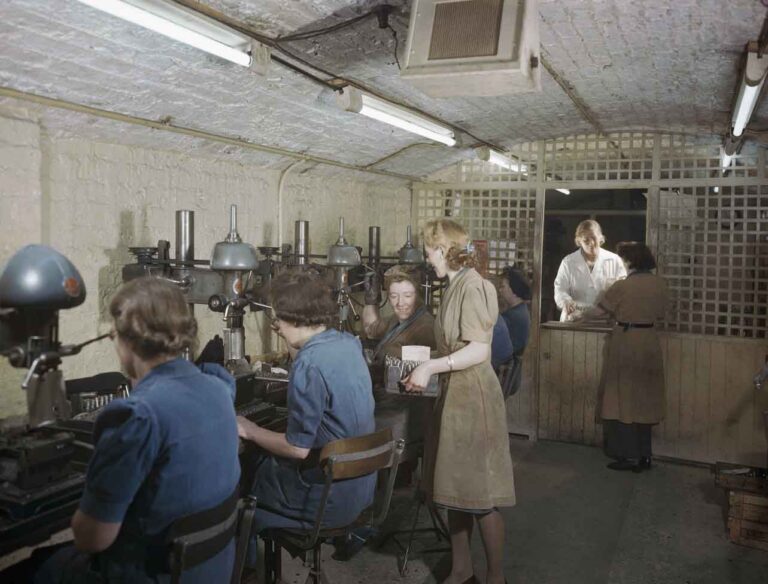Gender in an Inspector Calls
In the previous article in these series on the themes on ‘An Inspector Calls’, we looked at the issue of class division and social responsibility being explored in the play and also some of the wider social and historical context which the play was set in.
Some of what was mentioned in that article, which you can read by clicking on here, also touched upon the issue of the status of women.
Themes in ‘An Inspector Calls’: gender
In addition to the social inequality and class division that existed in Britain at that time there was also the relatively low status of women. Thus Eva Smith suffered not only for being part of the poor working class, reliant on the mercy of her employers (the Birlings in this case) for survival, but also for being a woman. After being sacked by Mr Birling for trying to improve workers rights, she later resorts to earning money through prostition and uses the pseudonym, Daisy Renton.
Whereas ‘Eva Smith’ is a reference to ‘Eve’ (mother of humanity and thus the archetypal woman, and Smith is a common English name, with Eva Smith thus being representative of the average British woman, ‘Daisy’ is a flower (and when women lose their virginity they can be said to be ‘deflowered’) and ‘Renton’ seems to connect with the word ‘rent’, that is to be paid for financially. In other words Priestly is also highlighting the sexual exploitation of vulnerable working class women by men.
Eva is made pregnant by Mr Birling’s son, Eric, but unlike him is physically impacted by it as the unborn child is inside her womb whereas Eric could live as if nothing had happened, though he did try and support Eva financially. However she refused as he was trying to use money taken illegitimately from Eric’s father’s business, and despite her poverty Eva’s morality was such that she refused to take stolen money. Ironically Eva had approached Mrs Birling in the past after her pregnancy when she went to a charity headed by Mrs Birling.
She sought help but Mrs Birling refused angered by Eva using the name Mrs Birling (which Eva was to somewhat justified in using in the sense that the father of her child was Mr Eric Birling). Mrs Birling, the mother, tells the inspector in the play that a the father (who ironically is her son little to her knowledge) ought to have born the responsibility of helping to support Eva and the pregnant child. Shortly after it emerges that her son, Eric is the father.
What is clear here is how vulnerable and precarious Eva’s existence was and how dependent she was on the good will of people richer than her. There is theme of money and financial aid with her rejecting the money offered to her by Eric as it was stolen money but trying to get aid from Mrs Birling’s charity. Despite doing morally the right thing by refusing the money that was taken from Mrs Birling’s husband when Eva tries to get financial support from the charity she is refused. This ultimately of course contributes to her tragic ending.
It could be argued that Priestly is also seeking to draw attention to the role of not just society, including the more well off in society, but the state. Later on in modern Britain single mothers would receive governmental monetary support to raise their children but not in 1912 when the play was set.
Priestly is highlighting the vulnerability of women, thus our need as a society to help them.
Women in 1912
The situation of women in 1912 was different to that of the 1940s when the play was written. By the 1940s women in Britain had experienced mass employment outside of the house. This was not the first time, the same had happened during the first world war.
However twenty years later it was another generation, and by then at least two generations of women, and two generations of men had personally experienced or been involved in the reality of mass female employment which included changing the financial status of women as their earning power increased.
It was something that was irreversible and though it may seem somewhat archaic today in modern Britain, the concept of a woman being exclusively a housewife eroded and was ended.

Source: ww2today.com
A woman in 1912 was seen as subordinate to a man and socially this persisted for decades after. The famous British comedian Harry Enfield pokes fun at this in some of his sketches in his parody of the early twentieth century British gender roles of the English middle-class, where women are expected ‘to know their place’ which includes to be secondary ornamental aids to their husbands but not to dare be ‘uppity’ and talk about ‘serious’ topics which are reserved for men. We can find examples of this in the play for instance when Mrs Birling says to her male family members in Act 1:
“I think Sheila and I had better go into the drawing-room and leave you men-“
This was in the context of the female family members retreating and allowing the men to talk about serious things. Thus women did not have a say or voice in important affairs not just in the play, which is an attempt to reflect 1912 Britain, and thus had little role in formulating the society which they were part of, which they lived in. Powerless, voiceless, weak and vulnerable, all adjectives which can in someways be applied to Eva Smith.
A famous BBC sketch on old fashioned attitude towards women in early 20th century Britain.
We also see Mrs Birling say of Eva:
““She was claiming elaborate fine feelings and scruples that were simply absurd in a girl in her position.“
Thus in this quote we can see both classism and sexism at the same time. ‘A girl in her position’. Position refers to her (Eva) social position as a working-class woman, and of course ‘girl’ refers to her gender. There is a supposition, a belief that a ‘girl’ and particularly of that social status should not be ‘uppity’ or have complex or ‘elaborate’ feelings. The working class ought to be simple and basic. Elaborate feelings are thus reserved for the rich. Everyone in that society has a designated role and place and there is little that they can do to challenge that or move out of it, i.e. social mobility.
Priestly however shows us that this dangerous and toxic cocktail of classism and sexism can be dangerous and have harmful consequences as we see in the death of Eva. He, similar to Dickens, provokes the sense of justice and morality amongst some in the affluent classes who would have seen this play and been appalled by the fate of Eva Smith and believed that such a thing could not be allowed to happen and on a fundamental level those deep social factors that contributed to her demise needed to be reformed.
To be fair Sheila does at one point attempt to point to the humanity of female workers when she says:
““But these girls aren’t cheap labour – they’re people”
Sheila does seem to not fully agree with some of the ideas on class and gender roles prevalent at that time. This is in stark contrast to Mrs Birling who in the beginning of the play tells Sheila when she seems to be having a semi-humorous criticism of Gerald for being busy:
“Now, Sheila, don’t tease him. When you’re married you’ll realize that men
with important work to do sometimes have to spend nearly all their time and energy on their
business. You’ll have to get used to that, just as I had.”
This is another quote that shows how deeply ingrained the belief in fixed gender-roles for men and women were at that time with Mrs Birling telling her daughter to conform to established gender-roles.
Historical context, Britain before and after ‘An Inspector Calls’.
Ultimately the world view that Sheila had in the play with female workers being ‘people’ (having humanity and not just to be utilised for labour) prevailed. Womens rights progressed in the subsequent decades. The British had two female prime ministers in later generations, Margaret Thatcher and Theresa May. However this was a result of centuries of long and hard struggle. A struggle which cannot be decoupled or delinked from the wider struggle of the working classes for greater rights. Though women were second-class citizens, so for centuries were the majority of their menfolk. Priestly shows however working class men could not seek to advance their rights and neglect the rights and status of women. The working class struggle had to embrace females.
Useful vocabulary for GCSE students in essays and exam questions.
- Sexism
- Misogyny – hatred of women.
- Misogynist – a man who hates women.
- Misogynistic – adjective of misogyny
- Patriarchal – a male dominated society
- gender-roles – The roles assigned to men and women in a society.
- Objectified – The phenomenon of women being seen only in a sexual perspective with their personalities unimportant but what sexual pleasure they could provide a man.
Example: ‘Priestly highlights the objectification of women as sex items with the words of the Inspector when he refers to Eric and says:
““just used her for the end of a stupid drunken evening, as if she was an animal, a thing, not a person,” (Act 3)” - Suffragettes – a feminist movement of the early 20th century who campaigned for womens rights.
- Vulnerable – being weak and able to go through suffering easily e.g. Eva Smith was vulnerable.
- Conservative – old fashioned or seeking to maintain things as they are and prevent change, Mrs Birling can be said to be quite conservative.
About English Made Simple

English Made Simple is a website dedicated GCSE English, IELTS Preparation and other things providing useful content to readers all across the world on how to improve their English

